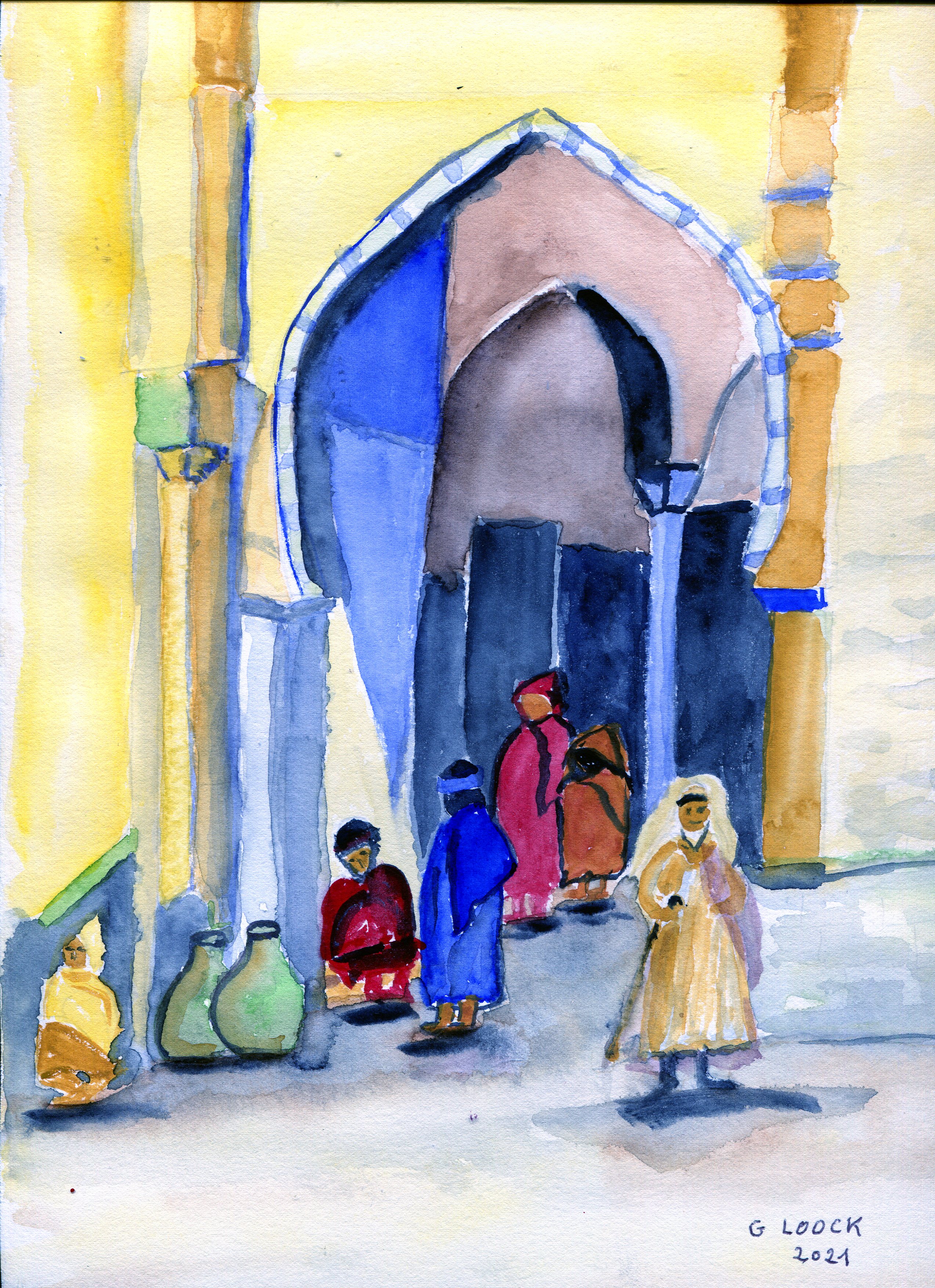Type 2 diabetes: "The COVID-19 lockdown was a real downward spiral..."
Published 29 Sep 2021 • By Candice Salomé
Pomme123, a member of Carenity France, has type 2 diabetes. She shares her experience of living with diabetes during the first COVID-19 lockdown.
Read her story below!

Hello pomme123, thank you for agreeing to share your story with us on Carenity!
First of all, could you tell us a little bit about yourself?
My name is Gisèle, I am retired after 40 years as a nurse and manager in hospital.
I am 72 years old and have been a widow for one and a half years. For the past year I have been living in a senior residence in a small studio on the ground floor with a small garden and sunroom for fresh air. It's quite nice.
My hobbies are photography, painting, drawing, reading, music, writing and board games, which I have picked up here in my new residence
I take part in all residence activities: memory, choir, gentle stretching, walking...

 Paintings of Gisèle work, courtesy of pomme123
Paintings of Gisèle work, courtesy of pomme123
You have type 2 diabetes, could you tell us when you were diagnosed? How did diabetes come into your life?
My diabetes came on very slowly, I was pre-diabetic from 1975 to 1997.
I thought that with a sugar-free diet it would last for a long time. But unfortunate life events (the suicide of my first husband) caused a violent emotional shock.
I had to pick myself up and process it all and raise my son alone.
I worked nights and had a reversed circadian rhythm. This started getting harder and harder on my body, and in 1997 the diagnosis came: fatigue, exhaustion, hunger, thirst, repeated infections (boils, bronchitis, urinary tract infections, etc.) that didn't heal, hyperglycaemia and hypoglycaemia, stomach cramps, sometimes sweating. So, it was official, I was diabetic.
How did you react to the diagnosis?
I had treated diabetes patients as part of my job in hospital, so I thought I was slipping through the cracks and that it only happened to others. I was angry with myself despite the early stages and the denial at the beginning... loss of confidence, withdrawal, I kept thinking "why me?"
This is how diabetes came into my life for good. It became my daily companion, my barometer that tells me when to stop.
I have come to accept my condition as a diabetic. It's a lot of work, it means mourning your old life and accepting all the constraints, I deprived myself of going out to restaurants, there were too many temptations... I still have a sweet tooth and I have to get my act together.
I was put on insulin quickly: a bolus of rapid-acting insulin at each meal and a slow-acting one at bedtime. The endocrinologist was very quick to explain the injections to me and then said, "you're on your own". I have been doing my own research on the complications of diabetes for a long time, I feel tired and diminished.
What did you think of the care you received? Were you satisfied with it?
I didn't receive any care, per se, until later, maybe 4 years later. At that time, I asked to be admitted into a centre for a week to learn more about diabetes management and to guide me with my insulin doses.
It really helped to clear my doubts and questions. I studied nutrition and the composition of meals (thanks to the courses they provided), the complications of diabetes and lots of other things. The course was beneficial, I really regained my self-confidence.
I think we really need support when you have a burdensome chronic illness like diabetes. Such courses like this aren't just for fun or a waste of tax dollars, I have truly become an actor in my illness. Sometimes at the senior residence there are mistakes with the meals, but on the whole it's fine.
In early 2020 the COVID-19 pandemic was wreaking havoc and France experienced its first lockdown in March. What was that period like for you?
It was a downward spiral, a year of many shocks in my life.
After three months in hospital for a shoulder fracture, my partner was placed in a nursing home at the beginning of the lockdown and died of COVID-19 three weeks later, all alone, in inhuman conditions...
I fell into immense grief and guilt... I was totally overwhelmed. This shock destabilised my diabetes, I felt weakened. I had to increase my insulin, I could do no exercise and had no means of having consultations at home. The doctors didn't visit anymore. I managed as best I could, but lockdown leaves physical after-effects (osteoarthritis, muscle wasting, weight gain, discomfort, withdrawal, lack of conversation, isolation, loneliness...).
It was a terrible time for me. My son told me: "sell your house" and he moved me next door to his home in a senior citizens' residence. I was uprooted again, I had to sort out and empty my house and part with a lot of memories, now it's better, but still there are no medical specialists in the countryside where we are.
How did the lockdown impact your care? Did it affect your health as well?
The lockdown had both a physical and a psychological impact: I was discouraged, depressed, isolated in my room, bored, sometimes snacking, which had consequences on my weight and diabetes...
It was a long and painful time for me, my GP renewed my prescriptions without going any further; there should have been video-consultations, phone consultations, or even videos from families. We suffered from the lack of contact, not being together, not seeing the grandchildren...
Can you tell us, now with hindsight, how you think things could have been improved?
It happened to us with a bat of the eye, so quickly... In the senior residence, we were protected from the virus with drastic rules and strict protocols.
Video consultation would have helped, I had one that went well, that I organised myself.
A psychologist came (for a discussion group) to evacuate stress and discomfort we were all feeling and to help us think positively.
Our activities should have been maintained (choir, gym, memory, etc.).
Despite everything on social media, all the safety measures (masks, gel and social distancing), COVID-19 got into our residence anyway through outside workers.
How do you see the future? What are your plans?
We are all vaccinated. My diabetic meals are taken care of by the residence kitchen, which is better. I would like to find medical specialists and accept that I live here now in this senior community, despite the shock of seeing all the wheelchairs and walkers on arrival.
I was suddenly thrown into another age bracket, the residents are between 85 and 96 years old, I am 72, the image of old age is sad with all its illnesses; I want to live as well as I can and continue my passion for painting, walking with my walking sticks, keeping my spirits up!
What do you think of patient exchange platforms like Carenity? Did it help you during the lockdown? What benefits did you get from it?
I found support, listening, sharing and comfort. These members carried me through when I lost my partner, my distress was so great, and they helped me not to do anything stupid and to get through this period of pain and loss. I thank them for their listening, their patience and their kindness. It's like a source of friendship, my pain is eased and also, I got good advice about diabetes.
What advice would you share with other Carenity members living with diabetes?
I would tell them to not play around with their diabetes (no fasting for example), to follow the instructions given to you, to check your blood sugar before eating, to note down your blood sugar levels in a monitoring booklet, to get blood tests done every 3 months, to respect meal times, to know the complications and signs of hypo or hyper, to be active, to keep busy, to walk, to stretch, and also, not to be too hard on yourself, to allow yourself a square of chocolate on Sundays for example. Treat yourself from time to time, live in the moment!
Many thanks to pomme123 for sharing her story with us here on Carenity!
Was this testimonial helpful to you?
Give it a like and share your thoughts and questions with the community in the comments below!
Take care!
1 comment


 Facebook
Facebook Twitter
Twitter


